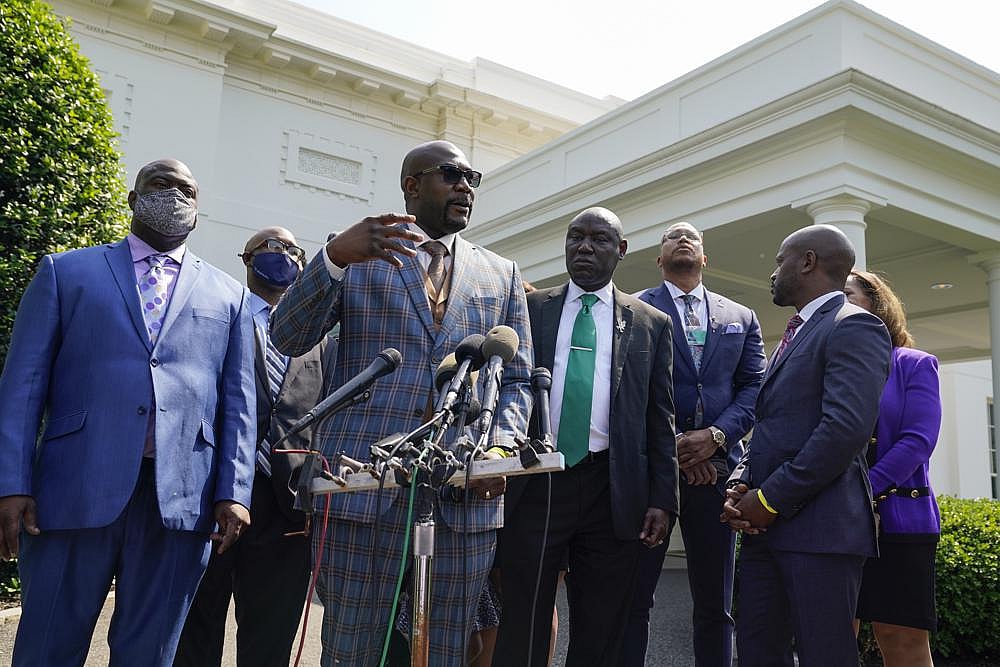The anniversary of George Floyd’s death was supposed to be a milestone moment, a time to mark passage of legislation to “root out systemic racism” in the criminal justice system, in the words of President Joe Biden. Instead, Floyd’s family visited Washington on Tuesday to mourn with Biden and prod Congress to act as they commemorate the loss of their brother, father and son one year ago.
“Today is the day that he set the world in a rage,” Floyd’s brother Philonise said, addressing reporters at the Capitol alongside family members, Democratic House Speaker Nancy Pelosi and other lawmakers. “We need to be working together to make sure that people do not live in fear in America any more,” he said.
Later, family members spent an hour with Biden and Vice President Kamala Harris at the White House.
“It was a remembrance of what happened to my brother,” Philonise Floyd said. He said of the meeting with Biden, “It was great, he’s a genuine guy.”
Biden told them “he just wants the bill to be meaningful and that it holds George’s legacy intact,” said George Floyd’s nephew Brandon Williams.
A sister, Bridgett Floyd, stayed away, aiming to come only when there is a bill to be signed into law.

Read More: Five ways George Floyd really changed the world
“That’s when I will make my way to D.C.,” she said from Minnesota.
George Floyd’s death sparked a global reckoning over racism and growing calls for police reform, but a legislative response has been elusive. Still, congressional negotiators remain optimistic about the prospects for a bill and they’ve displayed a steady solidarity that’s unusual for such talks, striking a consistently optimistic tone and never publicly sniping at each other.
“We hope to bring comfort to your family by passing the final bill very soon,” Pelosi said.
It’s a high-profile legislative fight where Biden has notably taken a back seat, preferring to leave the work of crafting a compromise to lawmakers on Capitol Hill, in contrast to his fevered advocacy, both public and private, for his infrastructure bill and the COVID-19 relief package.
“We have been respecting the space needed for negotiators to have these discussions,” White House press secretary Jen Psaki said.
She and congressional negotiators declined to offer a new deadline for reaching an agreement. California Rep. Karen Bass, the top House Democratic bargainer, said talks would continue “until we get the job done” while the top Republican bargainer, South Carolina Sen. Tim Scott, said separately that negotiations “have a long way to go still but it’s starting to take form.”
The Democratic-controlled House approved a sweeping bill in March that would make it easier for individual police officers to be sued and charged with crimes. It would also ban chokeholds, limit no-knock warrants and create a national database of officers with histories of complaints and disciplinary problems.
That bill has gone nowhere in the Senate, where the 50 Democrats will need support from at least 10 Republicans to overcome a bill-killing filibuster. GOP lawmakers have preferred more modest changes.
While Biden set the anniversary of Floyd’s death as the initial deadline for legislation to reach his desk, the issue of police reform is a particularly politically thorny one. Congressional negotiators have struggled to find a compromise that can make it through an evenly divided Senate.
Ben Crump, the Floyd family’s lawyer, called on Biden to “reiterate that we need to get it passed.”
White House advisers say Biden and his team have been in frequent touch with Capitol Hill negotiators over the legislation, but they believe this is an issue in which a high-profile public campaign by the president may do more harm than good.
But some activists say they’d like to see the president be more outspoken in advocating for the bill.
“President Biden has left it to members of Congress, and it’s in their hands right now. But the president will need to step up to make sure we get it across the finish line,” said Judith Browne Dianis, executive director of the Advancement Project, a racial justice organization.

Read More: What is really holding up the George Floyd policing act from Biden’s desk?
Still, it’s up to Congress, said Wade Henderson, interim president and CEO of The Leadership Conference on Civil and Human Rights, in a statement to the AP.
“It’s absolutely vital that members of Congress put partisan politics aside and pass meaningful reform to hold police officers responsible who act outside of their oath to protect and defend,” he said.
Floyd died on May 25, 2020 after former Minneapolis police officer Derek Chauvin kneeled on his neck for more than nine minutes, while Floyd repeatedly said he couldn’t breathe. His death sparked months of nationwide protests focused on racism and a renewed debate over police reform in the U.S. Chauvin was convicted last month on multiple charges stemming from Floyd’s death.
Congressional negotiators’ chief stumbling block has been “qualified immunity,” which generally shields individual officers from civil lawsuits. Democrats have wanted to eliminate that protection while South Carolina Sen. Tim Scott, the lead Republican bargainer, has proposed retaining that immunity for officers but allowing lawsuits against police departments.
While progressives and many criminal justice reform advocates are insistent that the bill eliminate protections for individual officers, some Democrats, most notably House Majority Whip Jim Clyburn of South Carolina and Senate Democratic Whip Dick Durbin of Illinois have said they could see a compromise on the issue. Senate Minority Leader Mitch McConnell, R-Ky., has said he wouldn’t support any bill that ends qualified immunity.
Have you subscribed to theGrio’s new podcast “Dear Culture”? Download our newest episodes now!
TheGrio is now on Apple TV, Amazon Fire, and Roku. Download theGrio today!

